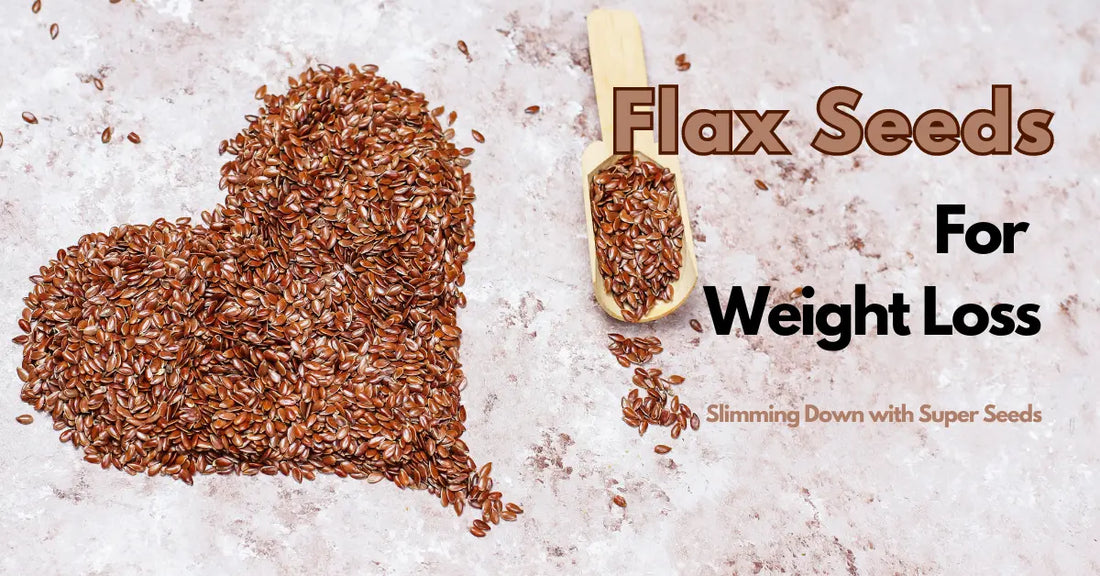- High fibre content.
According to research published in the Journal of Food Science and Technology, dietary fibre plays a role in boosting satiety and reducing calorie intake, resulting in weight loss. Flax seeds are a good source of dietary fibre, with one tablespoon containing around 3 grammes. This fibre level keeps you feeling full and satisfied, which helps you avoid overeating and manage your weight.
- Omega-3 fatty acids
A study published in the British Journal of Nutrition reveals that omega-3 fatty acids, which are plentiful in flax seeds, may help promote fat metabolism and reduce fat buildup in the body. These healthy fats improve the body’s capacity to burn stored fat for energy, making it simpler to lose weight.
- Blood sugar regulation
According to studies published in the Journal of Nutrition and Metabolism, flax seeds’ soluble fibre and alpha-linolenic acid (ALA) content help to improve glycemic control and insulin sensitivity. Flax seeds aid in stabilising blood sugar levels, which can contribute to cravings and overeating, thus supporting weight loss efforts.
- Antioxidant properties.
A study published in Nutrition and Cancer focuses on the antioxidant effects of lignans, plant components found in flax seeds. These lignans have been demonstrated to reduce inflammation, prevent oxidative stress, and improve general health. Flax seeds defend the body from injury, which promotes weight loss and overall well-being.
Table of Contents
How to Eat Flax Seeds for Weight Loss: Maximising Nutritional Benefits

Incorporating flax seeds into your diet is not only simple but also tasty. Here are numerous unique ways to eat flax seeds while aiding your weight loss journey.
Blend a spoonful of ground flax seeds into your favourite smoothie recipe for an extra nutritional boost. Flax seeds have a moderate flavour that will not overshadow your smoothie, but they will offer a delicate nuttiness and fibre to keep you full and content.
Sprinkle Ground Flax Seeds on Yoghurt or Porridge: To add crunch and nutrients to your morning yoghurt or porridge, sprinkle ground flax seeds on top. You may also add whole flax seeds to your cereal for extra texture and fibre.
Use them as a salad topping. Sprinkle whole flax seeds over salads to provide a crisp texture and nutty flavour. Flax seeds go great with leafy greens, vegetables, and proteins like grilled chicken or tofu. Drizzle a mild vinaigrette dressing over your salad to enhance flavour.
Mix them into your favourite dishes. To thicken soups, stews, and sauces while also adding nutritional value, stir in ground flax seeds. Flax seeds integrate nicely into savoury meals, adding fibre and omega-3 fatty acids.
Make Flaxseed Crackers: Mix ground flax seeds with water, herbs, and spices to form a dough, then roll it out and bake it till crispy. These handmade crackers are ideal for nibbling on the road and offer a healthy alternative to store-bought options.
Flaxseed Oil: Flaxseed oil is another way to incorporate flax seeds into your diet, although it lacks the fibre present in whole and crushed flaxseeds. Flaxseed oil can be used as a salad dressing or drizzled over cooked vegetables to provide flavour and nutrition. However, be aware of portion sizes, as flaxseed oil is high in calories and should be used in moderation as part of a balanced diet.
Flax Seeds Benefits for Female Weight Loss
Flax seeds are very effective for women who wish to lose weight. Not only do the seeds promote weight loss, but they also have other health benefits for a woman.
Hormonal Balance:
Flax seeds contain lignans, plant chemicals that resemble estrogen. It regulates the hormonal imbalance that women have as they undergo fluctuations of hormones. Hormonal imbalance has resulted in various issues for women, such as menopause, menstrual irregularity, and weight management issues. Metabolism also depends on balanced hormones.
The high fibre content in flax seeds supports digestive health, preventing bloating and constipation, which are common issues among women. A healthy gut aids weight loss by improving nutrient absorption and regulating appetite.
Skin and Hair Health:
Omega-3 fatty acids in flax seeds promote healthy skin and hair, which can boost confidence during your weight-loss journey.
Reduced Cravings:
The stabilizing effect of flax seeds on blood sugar levels helps in reducing cravings, especially for sugary foods, which is a common challenge for many women trying to lose weight.
The Best Time to Eat Flax Seeds for Weight Loss

Morning: Eating flax seeds for weight loss in the morning helps boost your metabolism and supply you with energy throughout the day. Adding powdered flax seeds to your breakfast, such as sprinkling them on yoghurt or blending them into smoothies, might make you feel full and content, lowering your chances of overeating later in the day.
Before Meals: Eating flax seeds for weight loss before meals can boost feelings of fullness and lower overall calorie intake. Eating a small serving of ground flax seeds or adding them to a pre-meal snack might help satisfy hunger and prevent overindulgence during meals.
After Workouts: Flax seeds can be a good post-workout snack since they contain protein, healthy fats, and fibre, which help with muscle rehabilitation and replenishing energy stores. Adding ground flax seeds to a protein smoothie or adding them to a post-workout meal can help with muscle regeneration and rehabilitation while also promoting weight loss.
Does Timing Matter?
While there isn't any particular rule on when to take flax seeds, consumption at different intervals of the day would make you get the most of its benefits. In the morning, they kickstart the metabolism. Before meals, they control hunger. Post-workout, they recover the body and prevent overeating.
Flaxseed Drink to Lose Weight
You can incorporate these super seeds by making a flaxseed drink. It is easy to make and very potent to shed excess pounds.
Recipe to Prepare Flaxseed Drink
Ingredients
1 tablespoon ground flax seeds
1 cup of warm water
A squirt of lemon if desired
How-to:
Mix ground flax seeds with warm water.
Stir well for the seeds to be diluted.
Add a squeeze of lemon for flavour and additional detox benefits.
How It Helps
This drink is rich in fibre and helps curb appetite, improve digestion, and boost metabolism. It is best drunk in the morning or before taking meals for maximum weight loss purposes.
Timing strategies for incorporating seeds
Spread seed consumption throughout the day: Include a variety of seeds in meals and snacks to deliver long-lasting energy and satiety.
Be aware of portion sizes. While seeds provide various health benefits, they are also calorie-dense, so they should be consumed in moderation as part of a balanced diet.
Experiment with various seed combinations. Mix and combine seeds to make delicious and nutritious meals and snacks that help you lose weight.
Frequently Asked Questions
Is flaxseed a fat burner?
While flaxseed is not a direct fat burner, as some products claim, it does contain elements that can help with weight loss. Flaxseeds are high in dietary fibre, which can increase feelings of fullness while decreasing overall calorie intake. Furthermore, omega-3 fatty acids may aid in fat metabolism and prevent fat storage in the body. Flaxseeds, together with regular exercise and healthy lifestyle choices, can help you achieve your weight management goals.
Can I soak flax seed overnight?
Yes, soaking flax seeds overnight can be useful. Soaking flax seeds softens their outer shell, which makes them easier to digest and absorb nutrients. This procedure can also help release beneficial substances, including lignans and omega-3 fatty acids.
Can flax seeds reduce belly fat?
While there is no specific meal that directly targets belly fat, incorporating flax seeds into a well-balanced diet may help with general weight loss, including belly fat reduction. Flax seeds are abundant in dietary fibre, which can increase feelings of fullness while decreasing calorie intake.
When should you eat flax seeds for weight loss?
The timing of flax seed eating varies according to personal preferences and lifestyle conditions. Incorporating flax seeds into meals or snacks earlier in the day, such as breakfast or lunch, may aid with weight loss goals by increasing feelings of fullness and lowering calorie intake throughout the day.
What is the recommended amount of flax seeds for weight loss?
The suggested daily dosage of flax seeds for weight loss is normally 1 to 2 tablespoons, which provides a healthy nutritional balance without consuming too many calories. To avoid calorie overconsumption, add flax seeds to a balanced diet alongside other nutritious foods and keep portion sizes in check.
What Happens If You Eat Flax Seeds Every Day?
Eating flax seeds daily can provide several health benefits due to their high nutritional value. Flax seeds are rich in dietary fibre, omega-3 fatty acids, lignans, and other nutrients that promote heart, digestive, and overall health. Consuming flax seeds regularly may help enhance feelings of fullness, manage blood sugar levels, improve cholesterol, and support good digestion.

